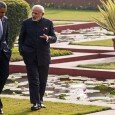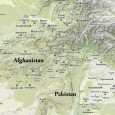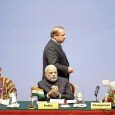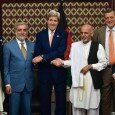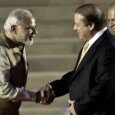Lt.-Gen (R) Talat Masood :
All for stability of Afghanistan
Gen. (Retd) Stanley McChrystal recently in an interview to the BBC referring to Afghanistan said, as the Taliban did not have the strength to take over all of Afghanistan “the greatest danger facing the country was the possibility of different groups vying for control which could lead to civil war.”
Others have voiced similar concerns, especially, if the Afghan government fails to sign the Bilateral Security Agreement with the U.S. and NATO forces well before the end of this year. Pakistan too has indicated that it will be in the regional interest that the U.S. forces and the international community remain committed to Afghanistan for a few years so that the Afghan security forces and other state institutions become sufficiently strong and be able to perform their functions and secure it from internal strife.
Besides, the U.S. and international assistance will be necessary so that the government in Afghanistan is able to finance and support the army and other security forces that have been created over the years.
Reconciliation between the U.S. and Taliban or between the Afghan government and Taliban before withdrawal of the U.S. and NATO forces seems to be a remote possibility. There has been little progress in negotiations even when countries like Qatar or Saudi Arabia acted as interlocutors. Although, a power sharing agreement between the Afghan government and the Taliban, prior to the U.S. withdrawal, would greatly facilitate a peaceful transition and secure the entire withdrawal from Afghanistan.
Failure of progress in the negotiations is due to the Taliban’s lack of interest in the reconciliation process and their belief that they will be able to militarily dominate Afghanistan once the U.S. forces withdraw. The role of President Karzai in the reconciliation process has not been very helpful either. Many neighbouring countries like Russia, Iran, India and many Central Asian states are opposed to the reconciliation process with the Taliban. They feel their influence will reduce once the Taliban are included in the Afghan power configuration.
Afghanistan’s future stability also depends on the role of the neighbouring countries. If Afghanistan becomes a battleground of neighbouring states to fight their proxy wars then it would be highly destabilizing for the entire region.
At least as of now, there are few indications that the regional powers are acting in concert to stabilize the situation. Rivalry between India and Pakistan, Iran and Saudi Arabia, Iran and the U.S., and U.S. and Russia seem to be playing out in one form or the other and fueling internal conflict.
The other factor that has given rise to instability and militancy in Afghanistan is opium production. Afghan’s opium production is said to contribute nearly 40 per cent of the country’s GDP, but its negative consequences on the economy, society and State has never been seriously addressed. The illicit opium trade is a major cause of corruption and one of the main sources of income for the warlords, the Taliban and politicians. Moreover, the ill effects of the Afghan drug trade has had serious affect on neighbouring countries especially, Pakistan in terms of increasing the number of drug addicts and promoting crime. Throughout the 11 years of U.S. occupation this problem was practically pushed under the carpet.
The indifference cannot continue and will have to be seriously tackled by the next Afghan government with the cooperation of regional countries and the international community.
Pakistan’s stakes in the stability of Afghanistan are very high as its own stability is inexorably linked to it. This would, however, not be possible to achieve without the full participation of the Pashtun who are the major ethnic group and mostly reside in provinces bordering the Pak-Afghan border.
The most difficult problem would be to determine power sharing without participation of the Taliban in the electoral process. It is also important to bear in mind that many Pashtuns are opposed to the Taliban. The two recent attacks on the Presidential candidate Abdullah Abdullah were a clear manifestation of the Taliban’s severe opposition to the democratic transition. All this makes the transition in 2014 a very complex affair.
Clearly, Pakistan’s interests are best served if Afghanistan is peaceful and stable but Pakistan would oppose undue influence from outside or regional powers, especially, India that gives a feeling of double encirclement on the eastern and western borders.
It is unfortunate that Afghanistan and Pakistan, despite being close neighbours and Muslim countries, have not been able to overcome the mutual distrust that borders on hostility.
The current transition in Afghanistan provides the two countries to revisit their policies towards each other. Firstly, Afghanistan and Pakistan have to establish the writ of the State in the sanctuaries held by the militants through military operations, if necessary. Both have to respect each other’s borders.
At present Afghan militant groups like the Haqani network and Gul Bhadurare are accused of launching attacks from North Waziristan and other parts of FATA. Similarly, the Afghan intelligence and Afghan National Army are openly and covertly supporting the Tehreek-e-Taliban Pakistan and other militant groups that are fighting the Pakistani State. For example, the presence of Mullah Fazlullah in Kunar shows the linkages between Afghan intelligence and the TTP’s current leader.
Improving relations between Afghanistan and Pakistan will require not only a good personal rapport between the top political and military leadership of the two countries, but has to be complimented by greater cooperation and close coordination at the institutional level.
Border management by both countries has to improve considerably and this will only be possible if sanctuaries are cleared that are being used by militants for hostile activities against each other.
Prime Minister Nawaz Sharif has made serious efforts at improving relations with President Karzai and there appears a greater level of understanding between them. It is important that the two leaders define their relationship on the basis of wellbeing of their people rather than pursue a narrow nationalistic agenda that in the past fuelled distrust and instability.
The writer is a retired Lt. General and a prominent commentator on issues related to politics and defence.






















































































